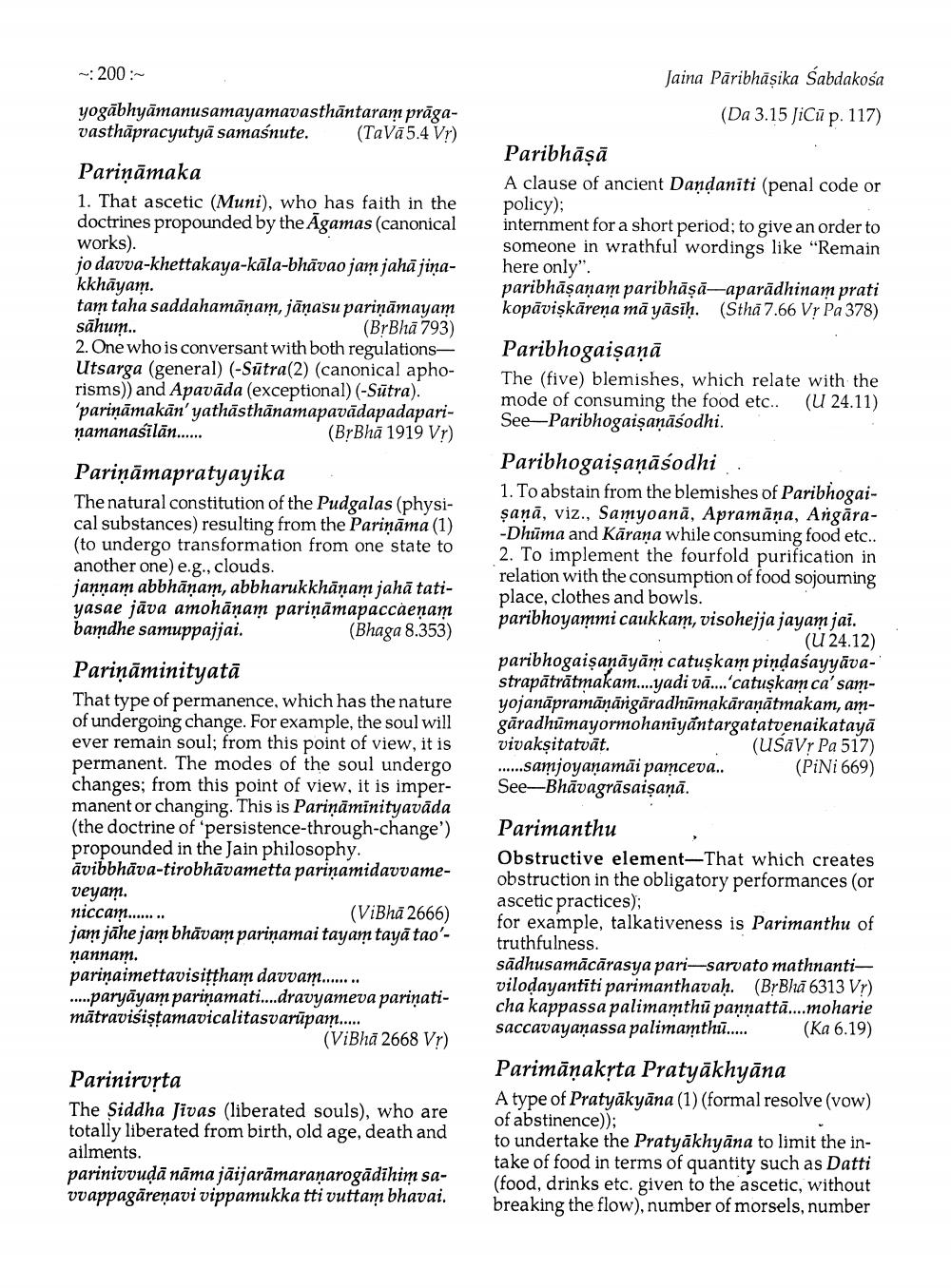________________
- 200:
Jaina Pāribhāșika sabdakosa
(Da 3.15 JiCū p. 117)
yogābhyāmanusamayamavasthāntaram prāgavasthāpracyutyā samaśnute. (TaVā5.4 Vr)
Parināmaka 1. That ascetic (Muni), who has faith in the doctrines propounded by the Āgamas (canonical works). jo davva-khettakaya-kāla-bhāvao jam jahājiņakkhāgam. tam taha saddahamānam, jānasu pariņāmayam sāhum..
(BrBhā 793) 2. One who is conversant with both regulationsUtsarga (general) (-Sūtra(2) (canonical aphorisms)) and Apavāda (exceptional) (-Sutra). 'pariņāmakān' yathāsthānamapavādapadaparinamanasilān......
(BrBhā 1919 Vr)
Paribhāsā A clause of ancient Dandaniti (penal code or policy); internment for a short period; to give an order to someone in wrathful wordings like "Remain here only". paribhāsaņam paribhāşă-aparādhinam prati kopāvişkāreņa māyāsih. (Stha 7.66 Vr Pa 378)
Paribhogaişaņā The (five) blemishes, which relate with the mode of consuming the food etc.. (U 24.11) See-Paribhogaişaņāsodhi.
Pariņāmapratyayika The natural constitution of the Pudgalas (physical substances) resulting from the Pariņāma (1) (to undergo transformation from one state to another one) e.g., clouds. jannam abbhāņam, abbharukkhāņam jahā tatiyasae jāva amohāņam pariņāmapaccaenam bamdhe samuppajjai.
(Bhaga 8.353)
Paribhogaisanāsodhi 1. To abstain from the blemishes of Paribhogaişaņā, viz., Samyoanā, Apramāņa, Angāra-Dhüma and Kāraṇa while consuming food etc.. 2. To implement the fourfold purification in relation with the consumption of food sojouring place, clothes and bowls. paribhoyammi caukkam, visohejja jayam jai.
(U 24.12) paribhogaişanāyām catuṣkam pindaśayyāvastrapātrātmakam....yadi vā.... catuṣkam ca' samyojanāpramāṇāngāradhūmakāraṇātmakam, amgāradhūmayormohanīyāntargatatvenaikatayā vivakṣitatvāt.
(ušāV? Pa 517) ......samjoyaṇamāi pamceva.. (PiNi 669) See-Bhāvagrāsaişaņā.
Pariņāminityatā That type of permanence, which has the nature of undergoing change. For example, the soul will ever remain soul; from this point of view, it is permanent. The modes of the soul undergo changes; from this point of view, it is impermanent or changing. This is Pariņāminityavāda (the doctrine of persistence-through-change') propounded in the Jain philosophy. āvibbhāva-tirobhāvametta parinamidavvameveyат. niccam........
(ViBhā 2666) jam jāhe jam bhāvam pariņamai tayam tayā tao'nannam. pariņaimettavisittham davvam........ .....paryāyamparinamati....dravyameva pariņatimätravisiştamavicalitasvarūpam....
(ViBhā 2668 Vr)
Parimanthu Obstructive element-That which creates obstruction in the obligatory performances (or ascetic practices); for example, talkativeness is Parimanthu of truthfulness. sādhusamācārasya pari-sarvato mathnantivilodayantiti parimanthavaḥ. (BrBhā 6313 VY) cha kappassa palimamthū pannattā....moharie saccavayaņassa palimamthū..... (Ka 6.19)
Parinirorta The Siddha Jivas (liberated souls), who are totally liberated from birth, old age, death and ailments. parinivvudā nāma jāijarāmaranarogādihim savvappagāreņavi vippamukka tti vuttam bhavai.
Parimāņaksta Pratyākhyāna A type of Pratyäkyāna (1) (formal resolve (vow) of abstinence)); to undertake the Pratyākhyāna to limit the intake of food in terms of quantity such as Datti (food, drinks etc. given to the ascetic, without breaking the flow), number of morsels, number




